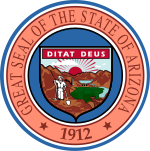| |||||||||||||||||||||||||||||||||||||||||
80 delegates (67 pledged, 13 unpledged) to the Democratic National Convention The number of pledged delegates won is determined by the popular vote | |||||||||||||||||||||||||||||||||||||||||
|---|---|---|---|---|---|---|---|---|---|---|---|---|---|---|---|---|---|---|---|---|---|---|---|---|---|---|---|---|---|---|---|---|---|---|---|---|---|---|---|---|---|
| |||||||||||||||||||||||||||||||||||||||||
 Election results by county
| |||||||||||||||||||||||||||||||||||||||||
| Elections in Arizona |
|---|
 |
| Pledged national convention delegates | |
|---|---|
| Type | Del. |
| CD1 | 5 |
| CD2 | 6 |
| CD3 | 5 |
| CD4 | 3 |
| CD5 | 5 |
| CD6 | 5 |
| CD7 | 4 |
| CD8 | 5 |
| CD9 | 6 |
| PLEO | 9 |
| At-large | 14 |
| Total pledged delegates | 67 |
The 2020 Arizona Democratic presidential primary took place on March 17, 2020, the third primary Tuesday of the month, as one of three contests on the same day in the Democratic Party primaries for the 2020 presidential election, while the contest in Ohio had been postponed for roughly a month. The closed primary allocated 80 delegates towards the 2020 Democratic National Convention, of which 67 were pledged delegates allocated according to the results of the primary.
Three major candidates ran in the primary, including former vice president Joe Biden, senator Bernie Sanders from Vermont, and representative Tulsi Gabbard from Hawaii's 2nd district. 12 other candidates who withdrew prior to the contest were also on the ballot, along with three minor candidates. Biden won the primary, with almost 44% of the vote and 38 delegates, while Sanders came in second place with almost 33% of the vote and 29 delegates. In a distant third was former mayor Michael Bloomberg, who came close to 10%, even though he had suspended his campaign nearly two weeks before and had issued an official withdrawal with the state, still remaining on the ballot.
Biden won 13 of 15 counties, with the exception of Coconino and Yuma, and 7 of 9 congressional districts.[1] Key to his victory were white voters, whom he won 51-32 per CNN exit polls, and suburban voters, who he won 53–32.[2] In a stark contrast from 2016, Sanders' strength was reliant primarily on non-white and Hispanic voters, whom Biden won by only 47-45 and 45–44, respectively. Biden would ultimately win the state of Arizona in the general election by 10,457 votes, making him the first Democrat to win it since Bill Clinton in 1996 and only the second since Harry Truman did so in 1948.
Cite error: There are <ref group=lower-alpha> tags or {{efn}} templates on this page, but the references will not show without a {{reflist|group=lower-alpha}} template or {{notelist}} template (see the help page).
- ^ "State of Arizona Official Canvass 2020 Presidential Preference Election – Mar 17, 2020" (PDF). Arizona Secretary of State. March 30, 2020. Archived (PDF) from the original on October 19, 2020. Retrieved March 31, 2021.
- ^ "Arizona Primary Polls". CNN. Archived from the original on February 28, 2020. Retrieved April 1, 2021.



